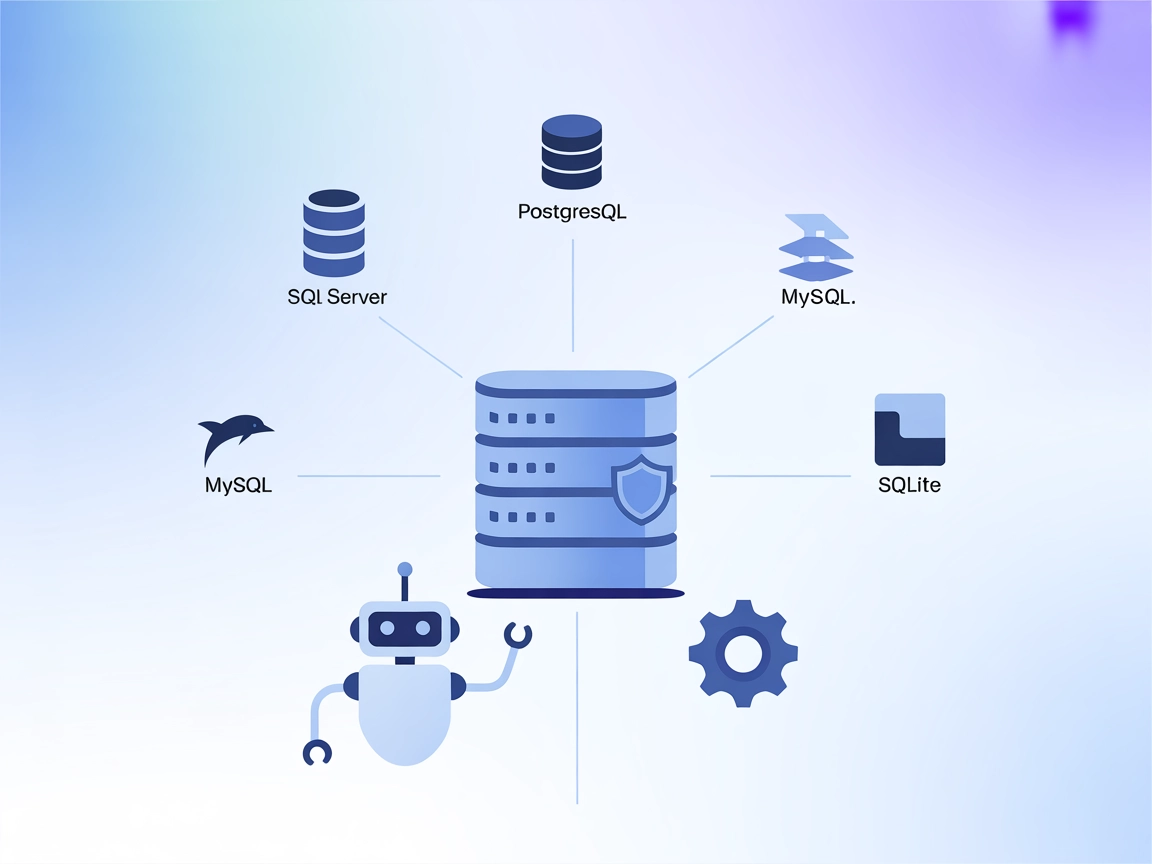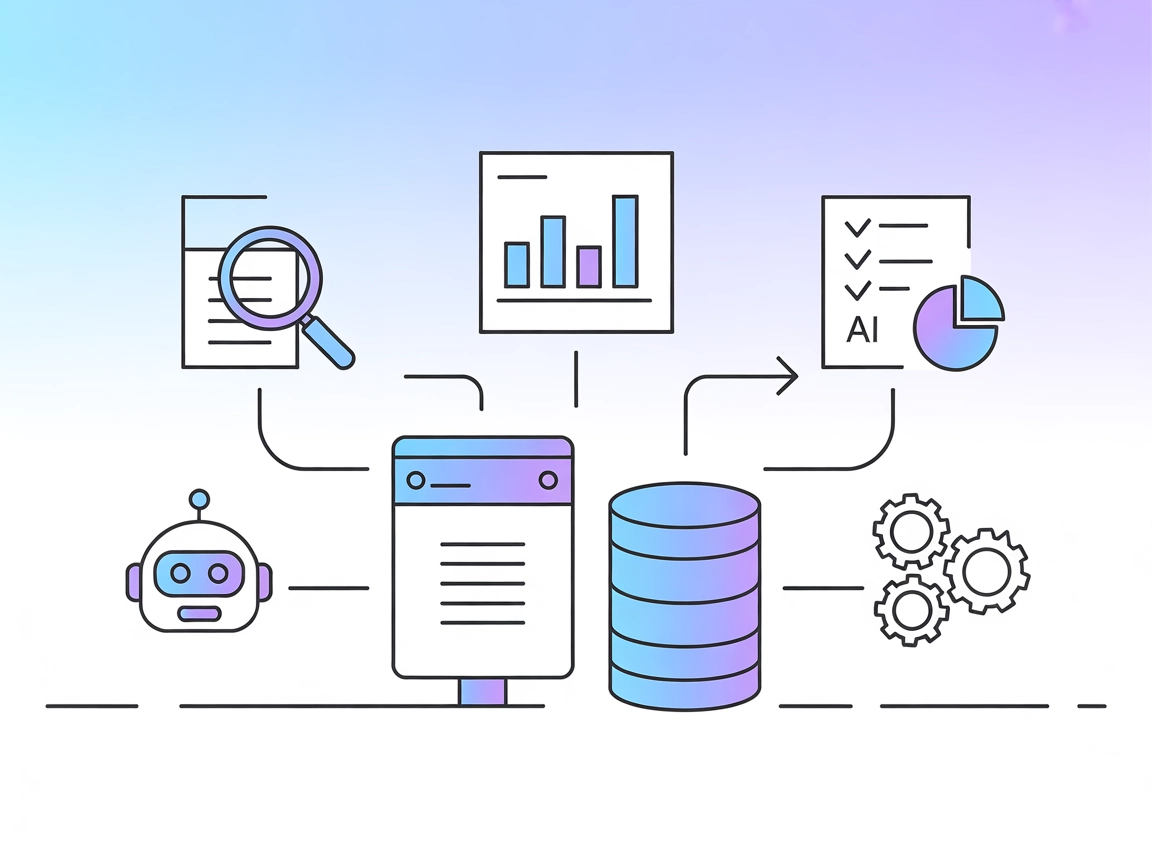
MCP Database Server
The MCP Database Server enables secure, programmatic access to popular databases like SQLite, SQL Server, PostgreSQL, and MySQL for AI assistants and automation...

Empower your AI agents and data teams with direct access to Teradata data warehouses using FlowHunt’s Teradata MCP Server integration.
FlowHunt provides an additional security layer between your internal systems and AI tools, giving you granular control over which tools are accessible from your MCP servers. MCP servers hosted in our infrastructure can be seamlessly integrated with FlowHunt's chatbot as well as popular AI platforms like ChatGPT, Claude, and various AI editors.
The Teradata MCP (Model Context Protocol) Server is designed to provide seamless integration between AI assistants and Teradata databases, empowering advanced database interaction and business intelligence workflows. It enables AI-driven systems to execute SQL queries, explore database schemas, and perform analytical operations directly on Teradata data warehouses. By exposing tools for querying, schema inspection, and data analysis, Teradata MCP Server allows developers and AI agents to automate tasks such as retrieving business insights, managing large datasets, and enhancing data-driven application development. Its functionality supports improved productivity for data analysts, engineers, and AI systems requiring real-time access to enterprise data stored in Teradata.
No prompt templates are explicitly mentioned in the repository.
No resources are explicitly documented in the repository.
query
Execute SELECT queries to read data from the database.
Input: query (string) — The SELECT SQL query to execute.
Returns: Query results as array of objects.
list_db
Lists all databases in the Teradata system.
Returns: List of databases.
list_objects
Lists objects in a database.
Input: db_name (string) — Database name.
Returns: List of database objects under the provided or user default database.
show_tables
Shows detailed information about tables in a database.
Input: table_name (string) — Name of the table.
Returns: Array of column names and data types.
list_missing_values
Lists the top features with missing values in a table.
list_negative_values
Lists how many features have negative values in a table.
list_distinct_values
Lists how many distinct categories there are for a column in the table.
standard_deviation
Returns the mean and standard deviation for a column in a table.
Database Query Automation
Leverage the query tool to automate retrieval of business data, enabling AI agents or developers to perform complex SELECT operations without manual SQL scripting.
Schema Exploration
Use list_db, list_objects, and show_tables to understand database structure, discover available tables, and inspect column types—essential for onboarding new datasets or building data-driven applications.
Data Quality Analysis
Employ list_missing_values and list_negative_values to detect data quality issues, such as missing or erroneous entries, which is crucial for data preprocessing and analytics.
Categorical Data Insights
Utilize list_distinct_values to identify unique categories within columns, supporting feature engineering and business reporting.
Statistical Summaries
The standard_deviation tool enables quick access to key statistics (mean and standard deviation), aiding in descriptive analytics and anomaly detection.
No specific setup instructions provided.
mcp-teradata repository.claude_desktop_config.json configuration file.mcpServers object:{
"mcpServers": {
"teradata": {
"command": "uv",
"args": [
"--directory",
"/Users/MCP/mcp-teradata",
"run",
"teradata-mcp"
],
"env": {
"DATABASE_URI": "teradata://user:passwd@host"
}
}
}
}
Store sensitive information (like DATABASE_URI) in the env section:
"env": {
"DATABASE_URI": "teradata://user:passwd@host"
}
Use environment variables or a secrets manager as needed.
No specific setup instructions provided.
No specific setup instructions provided.
Using MCP in FlowHunt
To integrate MCP servers into your FlowHunt workflow, start by adding the MCP component to your flow and connecting it to your AI agent:

Click on the MCP component to open the configuration panel. In the system MCP configuration section, insert your MCP server details using this JSON format:
{
"teradata": {
"transport": "streamable_http",
"url": "https://yourmcpserver.example/pathtothemcp/url"
}
}
Once configured, the AI agent is now able to use this MCP as a tool with access to all its functions and capabilities. Remember to change "teradata" to whatever the actual name of your MCP server is and replace the URL with your own MCP server URL.
| Section | Availability | Details/Notes |
|---|---|---|
| Overview | ✅ | |
| List of Prompts | ⛔ | None documented |
| List of Resources | ⛔ | None documented |
| List of Tools | ✅ | 8 tools described |
| Securing API Keys | ✅ | env used in config |
| Sampling Support (less important in evaluation) | ⛔ | Not documented |
Roots support: Not documented
Based on the available documentation and feature set, the Teradata MCP Server delivers solid database tooling but lacks comprehensive documentation on resources, prompt templates, Roots, and sampling support. It is functionally rich for database tasks but limited in standard MCP features and guidance.
| Has a LICENSE | ✅ (MIT) |
|---|---|
| Has at least one tool | ✅ |
| Number of Forks | 1 |
| Number of Stars | 6 |
Rating:
I would rate this MCP server a 5 out of 10. It provides a robust set of database tools and clear licensing, but lacks documentation for prompt templates, resources, Roots, and sampling, as well as platform-agnostic setup instructions. It is suitable for technical users already familiar with Teradata and MCP concepts.
The Teradata MCP Server enables AI-driven systems to interact directly with Teradata databases, automating SQL queries, schema exploration, and analytics within your FlowHunt workflows.
It provides tools for running SELECT queries (`query`), listing databases (`list_db`), exploring table structures (`show_tables`), inspecting data quality with missing or negative values, obtaining distinct category counts, and calculating statistical summaries like mean and standard deviation.
Sensitive connection details, such as `DATABASE_URI`, should be placed in the `env` section of your configuration or managed with environment variables to ensure security.
Automate business data retrieval, explore database schemas, analyze data quality, summarize categorical data, and obtain statistical summaries—all directly from your AI agents or workflows.
Currently, detailed setup instructions are only available for Claude Desktop. For other platforms like Windsurf, Cursor, or Cline, consult your system documentation or adapt the Claude instructions as needed.
Connect your AI agents to enterprise-scale Teradata databases for automated analytics, schema exploration, and data quality analysis with FlowHunt’s Teradata MCP Server integration.

The MCP Database Server enables secure, programmatic access to popular databases like SQLite, SQL Server, PostgreSQL, and MySQL for AI assistants and automation...

The MSSQL MCP Server connects AI assistants with Microsoft SQL Server databases, enabling advanced data operations, business intelligence, and workflow automati...

The Model Context Protocol (MCP) Server bridges AI assistants with external data sources, APIs, and services, enabling streamlined integration of complex workfl...
Cookie Consent
We use cookies to enhance your browsing experience and analyze our traffic. See our privacy policy.